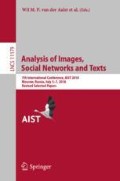Abstract
Topic modeling is usually used to model words in documents by probabilistic mixtures of topics. We generalize this setup and consider arbitrary features of the positions in a corpus, e.g. “contains a word”, “belongs to a sentence”, “has a word in the local context”, “is labeled with a POS-tag”, etc. We build sparse probabilistic embeddings for positions and derive embeddings for the features by averaging of those. Importantly, we interpret the EM-algorithm as an iterative process of intersection and averaging steps that reestimate position and feature embeddings respectively. With this approach, we get several insights. First, we argue that a sentence should not be represented as an average of its words. While each word is a mixture of multiple senses, each word occurrence refers typically to just one specific sense. So in our approach, we obtain sentence embeddings by averaging position embeddings from the E-step. Second, we show that Biterm Topic Model (Yan et al. [11]) and Word Network Topic Model (Zuo et al. [12]) are equivalent with the only difference of tying word and context embeddings. We further extend these models by adjusting representation of each sliding window with a few iterations of EM-algorithm. Finally, we aim at consistent embeddings for hierarchical entities, e.g. for word-sentence-document structure. We discuss two alternative schemes of training and generalize to the case where the middle level of the hierarchy is unknown. It provides a unified formulation for topic segmentation and word sense disambiguation tasks.
Access this chapter
Tax calculation will be finalised at checkout
Purchases are for personal use only
Notes
References
Arora, S., Li, Y., Liang, Y., Ma, T., Risteski, A.: Linear algebraic structure of word senses, with applications to polysemy. CoRR abs/1601.03764 (2016)
Arora, S., Liang, Y., Ma, T.: A simple but tough-to-beat baseline for sentence embeddings. In: International Conference on Learning Representations (2017)
Conneau, A., Kiela, D., Schwenk, H., Barrault, L., Bordes, A.: Supervised learning of universal sentence representations from natural language inference data. In: Proceedings of EMNLP, pp. 670–680. Association for Computational Linguistics (2017)
Hofmann, T.: Probabilistic latent semantic analysis. In: Proceedings of the Fifteenth Conference on Uncertainty in Artificial Intelligence, UAI 1999, pp. 289–296. Morgan Kaufmann Publishers Inc., San Francisco (1999)
Inan, H., Khosravi, K., Socher, R.: Tying word vectors and word classifiers: A loss framework for language modeling. CoRR abs/1611.01462 (2016)
Kiros, R., et al.: Skip-thought vectors. In: Proceedings of the 28th International Conference on Neural Information Processing Systems, NIPS 2015, pp. 3294–3302. MIT Press, Cambridge (2015)
Kochedykov, D., Apishev, M., Golitsyn, L., Vorontsov, K.: Fast and modular regularized topic modelling. In: Proceeding of the 21st Conference of FRUCT Association, ISMW, pp. 182–193 (2017)
Pagliardini, M., Gupta, P., Jaggi, M.: Unsupervised learning of sentence embeddings using compositional n-gram features. In: Proceedings of NAACL (2018)
Potapenko, A., Popov, A., Vorontsov, K.: Interpretable probabilistic embeddings: bridging the gap between topic models and neural networks. In: Filchenkov, A., Pivovarova, L., Žižka, J. (eds.) AINL 2017. CCIS, vol. 789, pp. 167–180. Springer, Cham (2018). https://doi.org/10.1007/978-3-319-71746-3_15
Press, O., Wolf, L.: Using the output embedding to improve language models. In: Proceedings of ACL: Volume 2, Short Papers, pp. 157–163. ACL (2017)
Yan, X., Guo, J., Lan, Y., Cheng, X.: A biterm topic model for short texts. In: Proceedings of WWW, pp. 1445–1456 (2013)
Zuo, Y., Zhao, J., Xu, K.: Word network topic model: a simple but general solution for short and imbalanced texts. Knowl. Inf. Syst. 48(2), 379–398 (2016)
Acknowledgements
The research was supported by Russian Foundation for Basic Research (17-07-01536).
Author information
Authors and Affiliations
Corresponding author
Editor information
Editors and Affiliations
Rights and permissions
Copyright information
© 2018 Springer Nature Switzerland AG
About this paper
Cite this paper
Potapenko, A. (2018). Probabilistic Approach for Embedding Arbitrary Features of Text. In: van der Aalst, W., et al. Analysis of Images, Social Networks and Texts. AIST 2018. Lecture Notes in Computer Science(), vol 11179. Springer, Cham. https://doi.org/10.1007/978-3-030-11027-7_14
Download citation
DOI: https://doi.org/10.1007/978-3-030-11027-7_14
Published:
Publisher Name: Springer, Cham
Print ISBN: 978-3-030-11026-0
Online ISBN: 978-3-030-11027-7
eBook Packages: Computer ScienceComputer Science (R0)

